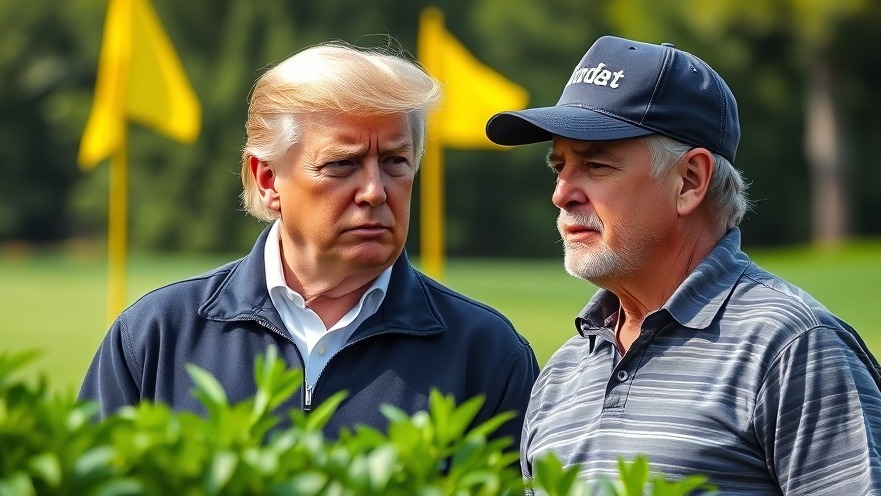
The Unlikely Partnership Between Trump and Stubb
The recent trade agreement between President Donald Trump and Finnish President Alexander Stubb marks a significant shift in diplomatic strategy, where friendship may be as crucial as policy. During their meeting, the two leaders agreed on a $6.1 billion deal for 11 rugged ships, showcasing an evolving relationship that has roots in a simple game of golf.
While many European leaders have sought Trump’s attention through traditional diplomatic methods, Stubb took an unconventional approach. Instead of bringing policy briefs to Mar-a-Lago, he arrived with golf clubs in hand, challenging Trump to a round. This encounter did more than just set the stage for casual banter; it established a rapport essential for opening diplomatic channels.
Strategies Rooted in Personal Rapport
Stubb’s ability to connect with Trump extends beyond the golf course; it is deliberate and strategic. Their relationship has been cultivated through frequent communication and mutual respect. During a prior meeting at the White House, Trump remarked on Stubb's appearance, calling him a “young, powerful man,” further solidifying a camaraderie that seems to bridge cultural and political divides.
While Finland, known for its serenity and stunning natural landscapes, may not often find itself at the forefront of geopolitical discussions, Stubb's relationship with Trump is elevating the nation to new heights within the military and Arctic strategy domains. Finland's geographical position and its role in security matters are becoming increasingly valuable amid rising tensions with Russia and China in the Arctic region.
The Rise of Finland in U.S. Military Strategy
This latest agreement to build icebreakers represents more than just a trade deal; it signals Finland’s growing importance as a cooperative partner for the United States. As Trump stated, "three of the ships will be built by Davie in Galveston, Texas, and four by Bollinger Shipyards in Houma, Louisiana." This arrangement aligns perfectly with Trump’s “Made in America” mantra and emphasizes job creation in the U.S. maritime sector.
Finland is not merely a supplier but is crucial in shaping the capability of the U.S. Arctic fleet. The country produces approximately 60% of the world's icebreakers and designs about 80% of the entire fleet, showcasing unique expertise that America is keen to leverage as competition heats up for Arctic navigation, fueled by climate change and economic interests.
Building a Strategic Military Relationship
This newfound collaboration has laid the groundwork for deeper defense ties, with Stubb emphasizing the importance of integrating Finland into U.S. military exercises. During discussions, he noted, "We are very pleased with the fact that we have so much training going on with American soldiers right now. They are getting experience from our Arctic conditions, and we are integrating our militaries together."
The implications for the broader NATO alliance and the strategic landscape in the Arctic cannot be understated. Finland’s entry into key defense projects positions it as more than just a partner; it becomes a strategic bridge linking U.S. interests with Arctic stability and security.
The Diplomatic Game of Golf
Stubb's innovative approach to diplomacy through golf highlights an important lesson for global leaders. In an era where formal politics often seem rigid, leveraging personal relationships can yield effective outcomes. As evidenced by the flourishing friendship between Stubb and Trump, sometimes a well-timed drive on the golf course can open doors that policy discussions cannot.
This partnership’s tenure will naturally be tested by the tides of political change, but for now, Finland reaps the benefits of an engaging and personal line of diplomacy. As Stubb continues to navigate through this unique dynamic with Trump, the strategic benefits for both nations appear profound and potentially transformative.
The Future of Finland-U.S. Relations
As Finland ascends to a more prominent role in U.S. defense and global strategy, it remains essential for Stubb to maintain this rapport. The balance between fostering personal relationships and leveraging national interests will be critical moving forward. Whether this partnership can withstand future political shifts remains uncertain, but for now, the strategic gains are tangible and growing.
As they continue to collaborate on defense, economic ties, and Arctic strategy, both countries have much to gain from this alliance that extends well beyond the golf course.
 Add Element
Add Element  Add Row
Add Row 



Write A Comment